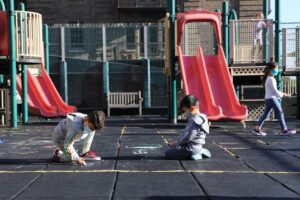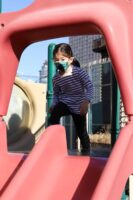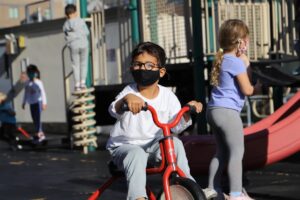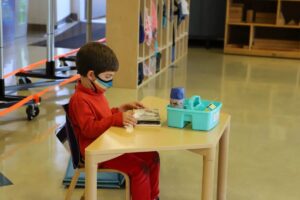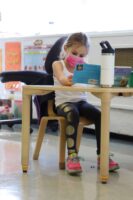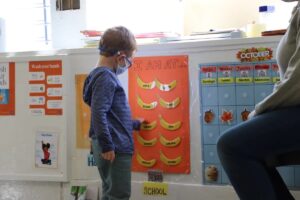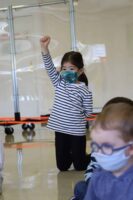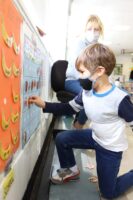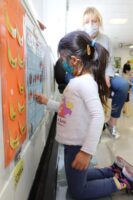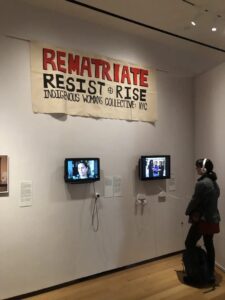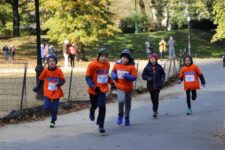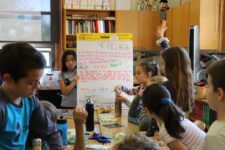At Ethical Culture, the Pre-K day starts with a romp around the rooftop. Students clamber up ladders, down slides, and across the padded floor. A cavalcade of tricycles circles the central playground set. A few students practice tracing letters, shapes, and numbers in chalk, tattooing the ground with colorful designs.
Though they’re the newest members of the ECFS community, Pre-K students are already at ease in their school home. Even as the COVID-19 pandemic has required modifications to the structure of school, in Pre-K, the daily rhythms of curiosity and play carry on.
One of the key moments of the day is morning meeting. Paisley Davidson, Pre-K Teacher, leads a pod of students as they gather around a wall taped with an assortment of colorful charts.
“Can you count how many kids are at school?” she asks. The class goes through the numbers, counting from one to nine. One student is absent, so their name tag must be moved from the “I am at school” chart to the “I am at home” one. Finding the right name — “It begins with an ‘r’ sound,” Davidson hints — is itself a task for four-year-olds learning to recognize the letters and sounds of the alphabet.
In Pre-K, a singular activity often encompasses several essential skills. Take the task of adding dates to the calendar: For the month of October, Davidson has printed out numbers in an alternating pattern of acorns and maple leaves that students must affix to the wall. In the course of raising their hand to await their turn, identifying the right number and the right image in the sequence, and finally placing the date in the correct cell of the calendar, students have practiced social interaction, numeracy, and pattern recognition — and that’s all before lunch.
Before the class breaks to eat, Davidson poses an intriguing question: “How do animals brush their teeth?” The ensuing discussion serves as a segue into Tomie dePaola’s classic picture book Bill and Pete, about a crocodile and an Egyptian plover who helps to clean his teeth. The students look on, giggling, watching Davidson flip through a book that in a few years they will be able to read themselves.
While Davidson leads her class on campus, Pre-K Teacher Karin Hoenig is busy watching over a fully remote pod. There are just three students in the pod, and the intimate class size presents a rare opportunity: “When you have such a small group, you can really get each child to express what they want to do,” Hoenig says.
Hoenig likes to begin the day by encouraging her students to talk about where they are. The students — calling in from Los Angeles, New York, and New Jersey — each have plenty to share with their peers about the climate and goings-on in their corner of the world. There’s also plenty of show-and-tell: In one previous session, Hoenig asked her students to bring a favorite stuffed toy to share with the class, and the students went around guessing what the stuffed toys were. Though everyone in the pod is geographically distant, these daily check-ins bring them closer together so that they can form the interpersonal relationships that are so integral to four-year-olds’ social-emotional growth.
It’s very much teaching Pre-K children how to make good choices for themselves.
Remote learning also provides myriad occasions for students to exercise their creativity. Rather than choosing from resources available at school, Hoenig gives her students the freedom to choose appropriate materials available in their homes. A task to find something to count might entail apples or pebbles, for example, while a task to find something to build might involve Legos or Magna-Tiles.
There are core competencies that Hoenig wants to ensure her students will master, of course — for instance, she’s compiled lists of activities that parents can consult to find fine and gross motor activities for their children to engage in — and each day is segmented into blocks of activity time. But, aside from the morning meeting, story time, and Music classes they have each day, the Pre-K students are given free rein to determine how to go about their schedules. That sense of independence and self-determination will serve them well for years: “It’s very much teaching Pre-K children how to make good choices for themselves,” says Hoenig.
A few times each week, the on-campus and remote pods coalesce as one grade, as all the students tune in to a virtual lesson with Music Teacher Angela Dixon. These are important opportunities for students to familiarize themselves with the classmates they will grow up with over the next fourteen years.
Back with Davidson’s pod, one of the last activities of the day is a photo hunt in Central Park. Pictures of the Pre-K students have been scattered around a field, and the children — each handed the photo of a classmate — are let loose to find a matching pair.

One by one, they return to Davidson, who congratulates them and gives them the chance to play the photo hunt again. Almost everyone says yes, and the field is amok with happy, running children.
To watch the ECFS Pre-K students explore the world is to be reminded of the sheer joy and wonder of early childhood — and the limitless possibilities of what comes next.

